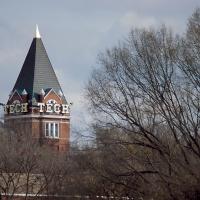The Institute for Data Engineering and Science, or IDEaS, is one of Georgia Tech’s 10 interdisciplinary research institutes. IDEaS provides the coordination and expertise necessary to link researchers across campus by strengthening Georgia Tech's position in big data. This installment of the Faces of Research Q&A…
On a crowded, vibrant planet with limited resources, the challenges facing society are increasingly complex. Whether it’s climate change, health disparities, or food security, the effective solutions will be multi-dimensional. Innovation this big requires teams of experts. Recognizing that, Georgia Tech’s Office of the Executive Vice President…
Keith McGreggor, Georgia Tech professor of the practice in the School of Interactive Computing, and director of VentureLab, has been named a Fulbright Specialist, one of only nine from Georgia Tech since the program began in 2001. The Specialist program, part of the larger Fulbright exchange offering that includes Fulbright…
Researchers William Sharp and Nicoleta Serban want kids to eat what’s good for them, and they want the healthcare industry to recognize the benefits – both physical and fiscal – of healthy eating habits for kids. Sounds simple. But it isn’t. About 5% of children struggle with significant feeding disorders. Many of them are sustained by feeding…
The Georgia Institute of Technology has selected Thomas R. Kurfess as the new executive director of the Georgia Tech Manufacturing Institute (GTMI). Kurfess is the HUSCO/Ramirez Distinguished Chair in Fluid Power and Motion Control and professor of mechanical engineering at Georgia Tech. He received his S.B., S.M., and Ph.D. degrees in mechanical…
By the end of this decade, offshore wind turbine generators (WTG) could provide enough energy to power 10 million homes in the United States. But producing all that new energy carries a surprising downside for large cargo ships, fishing boats, and other vessels that use radar to help navigate congested coastal waters. A recent study led by a…
In fiscal year 2021, Georgia Tech’s research enterprise — with grants, contracts, and other sponsored activities — totaled a record $1.2 billion, and we are currently on track to break that record in fiscal year 2022. To create a stronger business and service model to support initiatives, investigators, and continued growth, the Institute is…
The Military Graduate Research Program (MGRP) provides opportunities for U.S military personnel to conduct Department of Defense (DoD) related part-time research at the Georgia Tech Research Institute (GTRI) while simultaneously obtaining a graduate degree in a science, technology, engineering, or math (STEM) related master’s degree program at…
Heart attacks and surgeries like angioplasty, bypass, or transplants can lead to organ and blood vessel damage called reactive oxygen species (ROS). ROS is generated from four sources in cardiac tissue after heart attacks or reperfusion injury, the restoration of blood flow to previously deprived tissue: mitochondria, NADPH oxidase, uncoupled…
Graduate students at the Georgia Institute of Technology have built the first graffiti-painting robot system that mimics the fluidity of human movement. Aptly named GTGraffiti, the system uses motion capture technology to record human painting motions and then composes and processes the gestures to program a cable-driven robot that spray paints…














